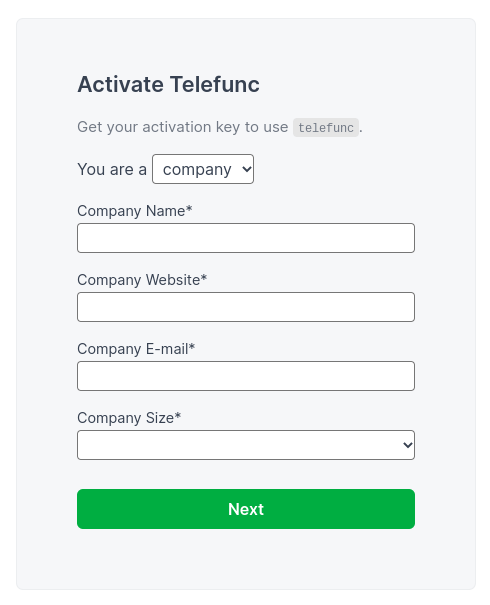FAQ
Lsos project users
Open source developers
Who needs to pay?
- Individuals
- Small projects
- Small companies
- Nonprofits of any size
Who needs an activation key?
- For a small project.
- For an open source project.
- During the Lsos project's free trial.
How do I get an activation key?
$ lsos activate <activation-key>.I'm a company, how much do I pay?
How long do fees apply?
Can I fork an Lsos project?
Can I fork an Lsos project to circumvent the fee?
Can I contribute to an Lsos project?
Can I choose the price?
- Price.
- The size of small companies for which your project is free.
- The size of projects for which your project is free.
- Free trial duration.
- 10$/month.
- Free for companies with less than 10 developers.
- Free for Git repositories with less than 3 Git active authors.
- 31 days of free trial.
What is trust mode?
By default, the Lsos library is set to enforce mode: when a larger company is missing an activation key, the Lsos library prevents the larger company from using your code.
With trust mode, the Lsos library never blocks larger companies from using your code. Instead, a pesky popup is occasionally shown in development reminding them to purchase an activation key.
Sublime Text, for example, is using such business model which has been successful for its dev team.
How does enforce mode work?
- Donations: 0.1% (Open Collective / GitHub Sponsors)
- Trust mode: 1%
- Enforce mode: 10%-50%
Even if we do a poor job with the enforce mode and achieve a rate of only 10%, the Lsos still increases your conversion rate by two orders of magnitude.
- Closed-source production build pipeline. The development pipeline is still open-source to allow contributions. If someone wants to fork your project, he'll need to recreate your build production pipeline which makes your project only 99% open source; it's not perfect but it can be a good trade-off.
- Fake anti-Lsos library. A way to cheat the Lsos is to write a script that removes the Lsos library code from your production build. We take measures against this practice (such as inlining the Lsos library, randomizing the structure of the inlined code, etc.) and we anonymously publish an anti-Lsos library that works enough to outperform competing anti-Lsos libraries, while making it not reliable and not trustworthy enough to discourage larger companies from using an anti-Lsos library.
- Add license clause to MIT-license. We developed a license clause that enforces larger companies to pay while preserving open source values. In general, we prefer not using copyright law because most developers don't understand how copyright works and many are afraid of using unknown licensing. That said, for some projects it can make sense to use copyright law.
Why not using a new license?
Can I remove the Lsos?
Is the Lsos library heavy?
Doesn't selling contradict the MIT License?
Permission is hereby granted [...] the rights to [...] sell copies of the Software.
How much does the Lsos take?
What exactly does the Lsos library do?
The Lsos library verifies that companies have a valid activation key: if the key is missing the library logs a warning in the developer console, and if the company persists in not getting an activation key then the library throws an error that blocks the usage of your code.
- your user's Git repository is public, or
- your user's Git repository had only few Git authors (less than 3 by default) in the last 3 months.
2. means that individuals and small projects don't need any activation key; the Lsos doesn't add any friction for them and they can use your project just like before. Exempt 1. means that anyone can develop and contribute to your project without any additional friction, just like before.Companies get an activation key by filling a short online formular. Small companies and nonprofits get a free activation key while larger companies pay to get an activation key.



$ lsos activate <activation-key> command.